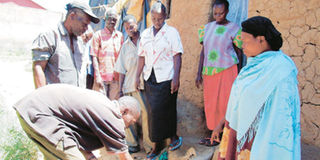Slum residents in battle for land with the dead

Residents of Makaburini estate are shown a skeleton by Mr Tom Mutange at the door of Ms Margaret Nekesa (in brown skirt). Photo/ISAAC WALE
Makaburini estate residents, it seems, stretched their luck too far by choosing to compete for space with the dead in a public cemetery in Kakamega Town.
Propelled by their plight, the families evicted from another slum 13 years ago moved into the burial ground dotted with graves.
Some former chief officers and councillors have been blamed for exploiting the plight of the families and allocating part of the cemetery for cash.
There are 256 families living at the cemetery near Maraba estate. Ironically, the neighbourhood of the slum is in stark contrast to the poverty endured by slum families. A set of posh residential houses put up by developers appear to eclipse the misery in the slum.
Villagers say they are troubled by strange happenings at the slum which they attribute to angry spirits out to haunt them for invading their abode.
Those interviewed have been pointing accusing fingers at the dead buried in tiny graves not far from their rickety homes. Some claim they had bumped into apparitions. They are also apprehensive about the presence of snakes at a rock on the edge of the cemetery.
They said the reptiles are no ordinary snakes but spirits lurking in wait to strike back at those who had settled at the burial ground, disturbing the peace of the departed souls.
Mzee Mohammed Kachisa, 69, said he had on several occasions come across apparitions at night as he walked along the narrow paths. “This usually happens at night. Sometimes you see somebody approaching you dressed in flowing white clothes but when you are about to meet him he just vanishes,” said Mzee Kachisa.
The residents have turned to prayers to appease the dead. “Muslims have resorted to burning incense at night before sleeping to drive away the evil spirits,” said Mzee Kachisa, who is the chairman of a welfare group for families at the cemetery.
Thirty-six-year-old Rose Agare, who lived in Bondeni slum estate with her colleagues before they were evicted, said they decided to relocate to the cemetery because they had no other place to go to.
Rose has lived at the cemetery for 11 years selling vegetables. She had some savings from her business and built a semi-permanent house where she now lives.
In the last six months, more than 100 unclaimed bodies from districts neighbouring Kakamega have been buried at the cemetery, raising concern among public health officials over an outbreak of diseases.
The residents have been complaining of the foul stench from the decomposing bodies which are sometimes dug out of the shallow graves by dogs and eaten up.
More families trooped to the cemetery two years ago following the demolition of the Kambi Somali slum next to Jamia Mosque on the Kakamega-Mumias road a year ago. The land was later allocated to private developers who are now putting up rental houses to beat a crippling house shortage in town.
At Makaburini slums, pressure has been mounting on the five-acre plot as more poverty-stricken families scramble for the crowded burial ground leading to the sprouting of the hovels.
The matter has sent alarm bells ringing, prompting environmental officials to write to the Kakamega council to resettle the families elsewhere and close down the cemetery.
Kakamega Central district environmental officer John Saisi has directed the council to de-commission the cemetery and look for alternative burial ground away residential estates.
“We have instructed the council to stop burying more bodies at the cemetery and look for alternative land to resettle the families living there,” said Mr Saisi.
A confrontation is looming between the council and the slum dwellers who have vowed not to leave until a place is identified to resettle them.
Town planning
Kakamega mayor Joe Serenge said the council was in a dilemma over the matter and did not have money to buy land to settle the families.
The council is unlikely to find a lasting solution to the problem soon, although the issue had been presented to the town planning committee.
Mayor Serenge said the council was considering approaching the neighbouring councils to jointly raise money to buy land and relocate the cemetery. “We want to put the proposal to them so that we can find a lasting solution,” said the mayor.
The council is also facing another financial headache as it seeks funding to buy land for a dump site. The uninhabited section of the cemetery is strewn with human skeletons which have been washed away from their shallow graves by rains or dug up by animals.
Mzee Abdalla Mohammed Nganyi, 52, said many homes renamed Al Karim were standing on graves with chilling human skeletons popping out of the ground.
“We were forced to move in and settle at the cemetery because we had nowhere else to go,” Mzee Nganyi reflected grimly.
When the families moved in and began digging up the ground to build their homes, they stumbled on human skeletons buried in tiny graves.




